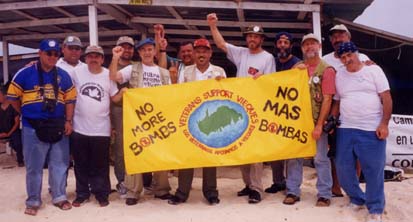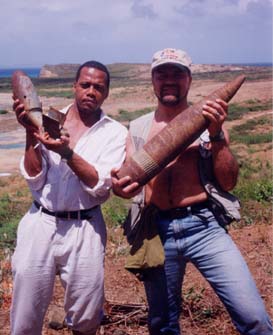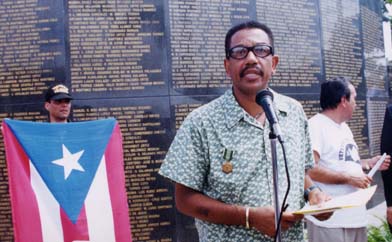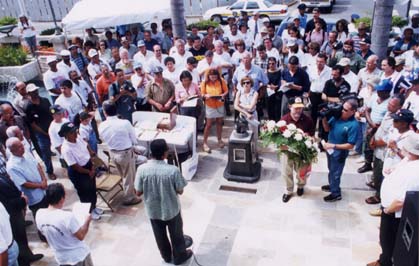 |
Veterans Support ViequesBy Dave ClineLast fall, the VVAW Clarence Fitch Chapter became involved in the movement to end bombing in Vieques after learning about it from Puerto Rican members and friends. In November, several of us went to a demonstration in Jersey City. We noted similarities with the plight of Agent Orange, Gulf War and atomic veterans. We also knew that many Puerto Rican veterans were involved in the movement and felt a duty to stand with them for peace just as we had been together in war. We decided to start an effort to rally veterans of all nationalities in support of Vieques, drafting a statement called "Veterans Support Vieques" and getting leaders of the veterans' community to sign on. The original version was issued with thirteen signatures, and the number of names continued to grow as we circulated it at VA hospitals, vet centers, online and at meetings. It was also printed in several newspapers, including The Stars & Stripes.  We were invited to attend a meeting called by Todo Nueva York con Vieques, Todo El Barrio con Vieques, the Vieques Support Campaign and other groups. People at the meeting welcomed our initiative and asked us to conduct a press conference on December 7 (Pearl Harbor Day) to highlight the fact that Americans still remember that "day that will live in infamy," yet the bombing of Vieques, which also began in 1941, has never ended. That press conference was covered on Spanish-language television and in the New York Daily News. We were invited to attend a meeting called by Todo Nueva York con Vieques, Todo El Barrio con Vieques, the Vieques Support Campaign and other groups. People at the meeting welcomed our initiative and asked us to conduct a press conference on December 7 (Pearl Harbor Day) to highlight the fact that Americans still remember that "day that will live in infamy," yet the bombing of Vieques, which also began in 1941, has never ended. That press conference was covered on Spanish-language television and in the New York Daily News.We participated in several demonstrations at the Federal Building and circulated a response to the American Legion national commander's public demand that the President order a resumption of bombing to ensure "national security." Our response pointed out that the Pacific fleet has no comparable training site, yet no one claimed a threat to national security there. The statement concluded: "As the Legion's national commander, you should be standing up for veterans' rights. The people of Vieques are fighting against the same problems that too many vets face, and they should be supported in their just struggle. Instead, you are walking point for the Pentagon." We learned that a Puerto Rico chapter of Veterans For Peace had been organized, so we contacted them and proposed sending a veterans' delegation to Vieques. They agreed to host our visit. Carlos Zayas, Luis Mendez, Wanda Colon and others put together the itinerary, and the trip was on for March 15-20. The delegation, mainly from the New York-New Jersey area, included Steve Williams from Black Vets for Social Justice; Jaime Vazquez, a Vietnam Marine vet and former Jersey City councilman; Gideon Rosenbluth, a WW2 vet and long-time labor activist; Carlos Vazquez, a Vietnam-era vet who is vice-president of his municipal workers' union; Anthony Guarisco, director of the Alliance of Atomic Veterans (AAV); and myself, a national coordinator for VVAW and the delegation leader. Accompanying us were photographer Dan Steiger and filmmaker John Nastasi. When we arrived in Puerto Rico, we spent several days in San Juan. A press conference about our visit received extensive media coverage. We met with a number of officials from the Popular Democratic Party including Sila Calderon, mayor of San Juan and their candidate for governor. The mayor of Carolina provided us with a van for transportation. On the third day, while waiting for the ferry to Vieques we were recognized and greeted by many people. A number of vets on their way to the San Juan VA hospital came up to talk to us about the problems they had with the VA or to thank us for supporting them. We met Carlos Zenon, a leader of the fishermen, who has been involved in this fight since the Seventies, along with his father and his sons - three generations fighting to defend their island. Upon our arrival on Vieques, we were met by New York City Councilman Jose Rivera. We met many others including Ramon Rodriguez, a senior citizen who showed us a Navy document dated 1943 giving him 48 hours to vacate his home when his land was confiscated. In 1950 he was drafted and sent to fight in Korea with the segregated all-Puerto Rican 65th Infantry Regiment. We stopped at the home of Rolando Garcia, a 28-year-old man who had worked on Camp Garcia for three weeks, painting near a depleted uranium dump. A few months later, his hair began to fall out until there was no hair left on his body. Medical tests revealed that there was uranium in his stool. Anthony Guarisco told him about the atomic vets' experiences with the health effects of radiation exposure and promised to ask the AAV to provide assistance. We met with leaders of the Committee for the Rescue and Development of Vieques, including Ismael Guadalupe, Robert Rabin, Doctors Rivera and Soto and others. That night we went to the Peace and Justice Camp at the gates of Camp Garcia where we were welcomed at a community rally and given the honor of changing the sign recording the number of days there had been no bombing. That night the number was 334. The next morning we took fishing boats to the camps. Minutes after we were ashore, a Navy helicopter flew over the area, recording our presence and monitoring the number of people in the camps. We traveled to most of the camps and saw the destruction of the earth. The area looked like a war zone, with bomb craters everywhere full of filthy, discolored water. One hill used for napalm strikes was completely charred. Unexploded live ordnance lay everywhere. Freddie Toledo, who had been with the 82nd Airborne in Vietnam, told me that he and several others had made it their mission to mark live bombs and mines for the protection of others in the camps. He also proudly showed us a deuce-and-a-half they had assembled from four trucks formerly used as targets - now the primary means of transportation between the camps.
We stayed that night at Cayo La Yayi. Hector Oliveri made us members of the collective, and Jaime Vazquez presented them with a small replica of the Statue of Liberty in the hope that America's ideals of liberty and justice for all would prevail. That night we went to sleep on the beach, listening to waves wash up under the moonlit sky. It was hard to imagine that such a tropical paradise was the site of so many years of naval bombardment and devastation. After two days in the camps, we returned to the main island where we met with Dr. Jose "Che" Paralitici, a leader of Todo Puerto Rico con Vieques; and Don Ricardo Alegria, director of the Center for the Advanced Study of Puerto Rico and the Caribbean, who at 82 is a legend for his many years of work to defend and preserve Puerto Rico's culture and history. Both encouraged us to continue our efforts. Seeing the civil disobedience camps were the center of the resistance blocking the Navy's return, the Justice Department gave orders to end the occupation after 381 days. On May 4, armed FBI agents and U.S. marshals conducted pre-dawn amphibious raids. Over 200 people were handcuffed, removed and detained but not charged with any crime. Coast Guard ships and helicopters patrolled the surrounding waters while the camps were destroyed. A Navy spokesman immediately announced they would resume bombing as soon as possible. The response throughout Puerto Rico was immediate. There were massive demonstrations at Fort Buchanan and other military bases. Students shut down the schools. Utility workers went on a one-day strike and the governor responded by calling out the National Guard. Picket lines went up in front of government buildings and workplaces. People were demonstrating everywhere. Since then, a new civil disobedience campaign has developed. Every week there are more arrests as groups slip through the fences to return to the bombing ranges. Hundreds of people have been arrested, charged with trespassing and ordered not to return. The number of arrests will continue to grow as more and more people put their bodies on the line for peace. Robert F. Kennedy Jr. has joined in the fight. As an environmental lawyer, he has gone to Vieques several times to gather evidence for lawsuits against the Navy by the Natural Resources Defense Council. Support has come from people in Korea, Okinawa and the Philippines who are also fighting against American military bases, and from Tibet's Dalai Lama.
In New York City, the National Puerto Rican Day Parade was dedicated to nationalist Albizu Campos and the people of Vieques. It became a popular demonstration of support for that beleaguered island, with a large delegation of Viequeses leading, many pro-Vieques contingents, and thousands of signs among the spectators declaring Peace For Vieques and Navy Out Now. Unfortunately, a group of young men sexually assaulted women in Central Park after the parade. These attacks have become the focus of most press coverage, obscuring the pro-Vieques message. Although the Spanish-speaking media have provided fairly consistent coverage, English-language reporting has been virtually non-existent until recently. Most North Americans still don't know the difference between Vieques and Viagra. The American media's dismal failure to inform the public has left many progressive people unaware of an important movement that needs and deserves their sympathy and support. Puerto Rico has been an American colony since it was seized during the Spanish-American War of 1898. Puerto Ricans were granted citizenship in 1917 and have had to fight in all this country's wars since then, but instead of the respect and rights that other Americans expect, they continue to be treated as second-class citizens, and their land remains a military colony. They are taking a stand against this oppression. We have a responsibility to assist their struggle for justice, dignity and peace. NAVY OUT OF VIEQUES! NO MORE BOMBS! Dave Cline is a member of the Clarence Fitch chapter of VVAW and a national coordinator.
|



 Many people stayed at the camps for extended periods, and others came on weekends. At the Independence Party camp on the Carribean side of the island, we sat down with Reuben Berrios, the party's candidate for governor who resigned his seat in the Puerto Rican senate to stay in their camp. When asked why the Navy seemed so adamant to stay, he said it had nothing to do with national security, but instead imperial arrogance.
Many people stayed at the camps for extended periods, and others came on weekends. At the Independence Party camp on the Carribean side of the island, we sat down with Reuben Berrios, the party's candidate for governor who resigned his seat in the Puerto Rican senate to stay in their camp. When asked why the Navy seemed so adamant to stay, he said it had nothing to do with national security, but instead imperial arrogance. At a Memorial Day ceremony in San Juan, over 250 veterans returned military medals with a signed statement that said in part, "We are sending our National Defense Medals back to you, Mister President, commander-in-chief of the armed forces. From the perspective of common defense, that medal doesn't mean anything to us anymore. How can we otherwise respond to the absurdity of this mutual defense agreement when at this moment of aggression and belligerence, our ally has become the hostile aggressor?" The medals were delivered to Illinois Congressman Luis Gutierrez, who agreed to present them to President Clinton.
At a Memorial Day ceremony in San Juan, over 250 veterans returned military medals with a signed statement that said in part, "We are sending our National Defense Medals back to you, Mister President, commander-in-chief of the armed forces. From the perspective of common defense, that medal doesn't mean anything to us anymore. How can we otherwise respond to the absurdity of this mutual defense agreement when at this moment of aggression and belligerence, our ally has become the hostile aggressor?" The medals were delivered to Illinois Congressman Luis Gutierrez, who agreed to present them to President Clinton.